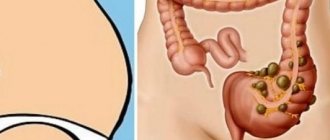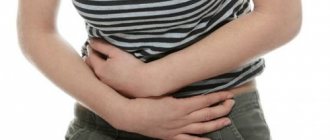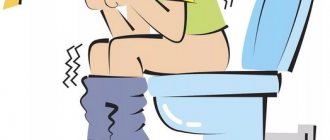The stomach is a section of the digestive tract, a temporary “storage” for food, located in the upper part of the abdominal cavity. It plays an important role in the human body; primary processing of food that enters through the esophagus occurs here. Gastralgia has a different character: dull and sharp, there may be a feeling of heaviness or pressing pain in the stomach. If discomfort spreads to other organs, accompanied by fever, nausea, diarrhea, fainting, this may indicate a serious illness, you must call an ambulance.
Sometimes heaviness occurs from excessive consumption of food or dry food. In such cases, it is worth determining the frequency of gastralgia and starting to follow a diet. If you experience any discomfort, you should consult a doctor. Early diagnosis will help avoid serious consequences.
Causes of pain
Gastralgia can occur due to disruption of the gastrointestinal tract, and also signal the presence of diseases of other organs. Sometimes a feeling of pressure can appear in completely healthy people, which indicates a disorder in the person’s diet, routine or lifestyle. If heaviness occurs immediately after eating and goes away quickly, the cause may be overeating. If the feeling of squeezing is not associated with eating or is constant, you should consult a doctor.
Causes of heaviness in the stomach
Compressive pain is not always a symptom of a serious illness. Sometimes the body reacts to external stimuli. If compression occurs infrequently and goes away quickly, it may be caused by:
- Allergic reaction;
- Osteochondrosis;
- Pregnancy, especially in the third trimester;
- Violation of intestinal microflora due to taking antibiotics;
- Physical activity;
- Spasm of the diaphragm.
Severe stress, depression, or driving fast can cause oppressive sensations. In these cases, epigastralgia is an additional symptom that should be paid attention to. If the severity is not associated with the listed conditions, you need to contact a gastroenterologist and conduct an examination of this organ.
Serious violations
- Diseases and infections of the respiratory tract: pneumonia, sore throat, acute respiratory infections.
- Damage to the gastric mucosa.
- Gastritis, gastroduodenitis.
- Functional disorders of internal organs.
- Poisoning.
- Polyps.
- Cancer, stomach ulcer.
- Pancreatitis.
- Pathologies of the large and small intestines.
These diseases provoke severe pain, heaviness, and discomfort.
Rare symptoms of a very common pathology
Almost half of the world's adult population is susceptible to it, to one degree or another. Many people occasionally experience signs that stomach contents are backing up into the esophagus:
- 50% of adult men and women experience pathological symptoms of gastroesophageal reflux at least once a month;
- 30% remember them weekly;
- 10% suffer from them daily.
However, some studies show that about 85% of patients do not even suspect that they are sick, since they do not feel the symptoms of GERD, while their esophagus suffers from regular gastroesophageal reflux.
Usually the main complaints are a burning sensation in the chest or throat. This is heartburn. But gastroesophageal reflux can also cause other symptoms that, to an uninitiated person in medical secrets, seem to be something very far from disturbances in the functioning of the lower esophageal sphincter. And only a specialist can discern this pathology, for example, in a patient with frequent pneumonia and complaints of bitterness in the mouth. Or diagnose it in a patient who suffers from pain in the heart area.
The popular medical portal MedAboutMe will briefly talk about heartburn and some other signs of GERD. The culprit is the “undisciplined” lower esophageal sphincter, which is unable to protect the “road of food” leading to the stomach from throwing its contents back.
Localization and nature of pain
Depending on where the pain occurs and what nature it is, you can understand the probable disease. The abdomen and stomach may hurt after eating, during the day or at night, on an empty stomach or after eating a large meal. An important principle is to understand what the syndrome indicates, consult a doctor in time and prevent critical consequences.
Pain after eating
The appearance of heaviness after eating may indicate serious functional disorders. After taking antibiotics, the so-called “lazy stomach” syndrome occurs; it indicates a lack of enzymes necessary for digesting food.
- Binge eating. Food entering inside puts pressure on the walls, resulting in heaviness. In the absence of illness, this sensation should go away soon after eating.
- Lactose intolerance.
- Insufficient fluid.
- Large amount of protein.
- Poor nutrition.
By the nature and location of pain symptoms, a disease or pathology can be determined. Unpleasant sensations may occur in the epigastrium after eating.
Stomach pain may indicate:
- Esophageal stenosis is a narrowing of the lumen of the esophagus. Associated symptoms: nausea, vomiting, belching.
- Gastritis is inflammation of the mucous membrane.
- Ulcer. In advanced cases, surgical intervention is required.
- Obstruction is the obstruction of food between the stomach and duodenum.
- Esophageal hernia.
Abdominal pain may be a symptom of:
- Colitis.
- Esophageal ulcers.
- Urolithiasis.
- Cholecystitis.
- Pancreatitis.
- Inflammation of the esophageal mucosa.
- Irritable bowel syndrome.
Pain on an empty stomach
Pain on an empty stomach occurs due to irritation of the stomach walls. Gastric juice helps process food entering the body; in the absence of food, acidity increases and a painful sensation occurs. With a peptic ulcer, the sensation intensifies. On an empty stomach, pain manifests itself with gastritis, hypermotor dyskinesia, when a spasm occurs and the wall contracts, causing discomfort. Rarely during stress reactions.
Stomach pain radiates to the back
In some cases, after eating, and less often on an empty stomach, your back begins to hurt. Pain can be felt in the lower back with gastritis, ulcers, acute pancreatitis and hepatic colic. In this case, the localization will be different. A pulling sensation in the lower back indicates an exacerbation of the ulcer; with pancreatitis, it radiates to the lower back and scapular region. If pain radiates to your back, this is a reason to consult a doctor. In some cases, emergency assistance is required.
Excessive salivation
If any food entering the mouth causes a person to salivate profusely, this may indicate gastroesophageal reflux. The salivary glands act as indicators that are the first to notice danger in the form of stomach contents in the esophagus. Before heartburn, nausea and other symptoms appear, increased saliva production begins. This is how the body tries to put out the flaring “fire”.
What to do for stomach pain
When the stomach hurts, a person experiences internal discomfort. Treatment depends on the disease, which can only be identified after a medical examination and consultation with a specialist. To relieve pain, take medications that reduce spasms: No-shpa, Spazmalgon. If the cause is an incorrect diet, medications that block gastric enzymes and have enveloping properties can help: Omez, Almagel.
During pregnancy, spasmodic pain in the abdomen may indicate that contractions are beginning, in which case you need to call an ambulance. If the severity is accompanied by fever, nausea, and poor health, the woman needs an urgent medical examination and consultation with a doctor.
At home, decoctions of chamomile, yarrow, mint, and flax seeds are used for calming. These substances have a calming effect and help relieve spasms.
Regardless of the cause of the discomfort, it is recommended to follow a diet to relieve symptoms and prevent the condition from getting worse. A proper diet will allow you to more accurately determine the need to see a doctor. In case of exacerbation of pain caused by poor nutrition, it is advisable to refrain from eating for at least one day, the body will “rest”. After a hunger strike, you need to gradually expand your diet, starting with soft foods: cottage cheese, yogurt, low-fat sour cream. It is advisable to exclude fried, spicy, smoked foods. Replace meat with steamed fish. Vegetables should be treated with caution; some aggressive substances contained in citrus fruits and other fruits and vegetables can be dangerous.
Treatment with traditional methods
Many people frown upon traditional medicine. In this case, you can try several effective folk methods to relieve pressing pain in the stomach.
If such symptoms occur in the summer, you can try eating several large ripe plums. This fruit has antispasmodic properties and helps improve gastric motility.
Another effective way in the summer is rosehip decoction. To prepare it, you need to pour a tablespoon of gooseberries into a glass of water and boil over low heat for 15-20 minutes. This decoction is used in a glass 3 times a day.
The most proven method is to drink warm chamomile tea in small portions throughout the day. This plant has anti-inflammatory properties and also reduces pain in the gastrointestinal tract.
Diagnosis of stomach diseases
A thorough examination helps to identify a functional imbalance in the body; based on these tests, the doctor prescribes medication; in critical situations, treatment may require surgical intervention.
Procedures necessary for an accurate diagnosis:
- Ultrasound;
- Gastroscopy;
- Analysis of urine, feces, gastric juice;
- X-ray.
After medical procedures, a final diagnosis is made and treatment is prescribed.
Treatment options
It is difficult to get rid of dyspnea right away. To do this, the patient is recommended to eat something sour after eating or take acid-lowering drugs that will help digestion and the process will go smoothly. Typically, patients experience bloating, stomach pain, heaviness and gas formation, which compresses the diaphragm, causing difficulty in heartbeat and breathing. Therefore, many people confuse shortness of breath from the stomach with signs of pathologies of the cardiovascular system. Therapy for the disease is prescribed only after determining the causes of its occurrence. It includes comprehensive treatment:
Medicines will help get rid of the troubling problem.
- medicines;
- acid-lowering agents;
- diet;
- folk remedies;
- prevention procedures (sanatoriums, physiotherapy, proper nutrition).
Return to contents
Recommendations for the prevention of stomach diseases
Serious diseases are the result of a complex of factors affecting human health. External and internal irritants negatively affect the condition of internal organs. Much depends on a person’s lifestyle, habits, nutrition, and habitat.
To prevent serious diseases, it is recommended to follow simple rules that will help avoid problems in the future:
- The first rule is proper nutrition. Healthy food, fresh foods, and a reduction in fried, spicy, and smoked foods in the diet will help the body cope better with processing food.
- The second rule is diet. Overeating at night, large amounts of food increase the load on the stomach, leading to heaviness and unpleasant sensations. The last meal should be a few hours before bedtime, this will help digest food while the digestive organs are in the active phase.
- Proper consumption of proteins, fats, carbohydrates, balanced dosage.
- When taking antibiotics, take supplements that help improve intestinal microflora.
The stomach is a sensitive organ of the human body, acutely reacting to external and internal changes. Malnutrition, stress, diseases of adjacent internal organs affect his condition. If gastralgia is periodic, you should consult a specialist. Preventing diseases in the early stages will help prevent serious consequences and maintain health.
Attacks of suffocation
If a person has breathing problems, and especially if they get worse at night when he is in bed, an alarming symptom may be due to gastroesophageal reflux. When the lower esophageal sphincter does not close tightly, the acidic contents of the stomach enter the esophagus and from there enter the respiratory tract. It causes irritation of the mucous membranes, so it becomes difficult for a person to breathe, he suffocates, coughs and sometimes “invents” the most terrible pathologies for himself, from bronchial asthma to tuberculosis.
Forecast
Most diaphragm spasms are temporary and go away within a few minutes. Muscle interventions, medications, and lifestyle changes can help manage persistent symptoms.
If diaphragm spasms occur due to a medical condition that requires medical attention, such as a hiatal hernia, phrenic nerve irritation, or diaphragmatic flutter, your doctor will help you create an individualized treatment plan.
This article uses materials from Medical News Today magazine.











